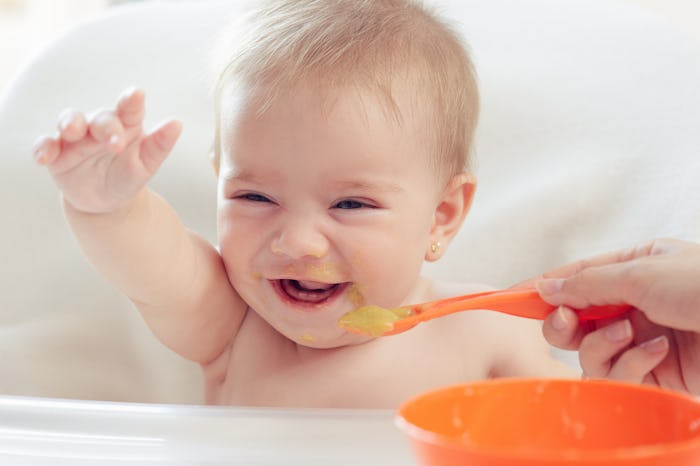Life

Why You Shouldn't Give Your Baby Extra Potassium
Feeding your baby can be both an art and a science. You have to balance your baby's natural appetite and moods against his daily dietary needs. Sometimes, those needs feel kind of overwhelming. For instance, do you need to give your baby potassium, or will he get enough of the K element in his normal diet?
First, why is potassium such a big deal, anyway? The big K packs a ton of health benefits. According to the University of Maryland Medical Center (UMMC), potassium is a mineral that is essential for the functioning of the body's cells, tissues, and organs. Everything from your heart to your digestive functions relies on potassium, as further noted by UMMC. Basically, potassium helps your whole body's ability to function.
With this in mind, how do you make sure your baby gets enough potassium to grow up healthy and strong? According to Oregon State University's Linus Pauling Institute, newborns to 6 month olds require 400 mg of potassium per day, whereas babies aged 7 to 12 months need 700 mg. This may sound like a lot, but chances are, your baby is already getting the necessary amount of this vital mineral.
As is often the case, nature has probably already taken care of your baby's potassium needs. If they are breastfed, theUnited States Department of Agriculture National Nutrient Database noted that one cup of breastmilk contains about 125 mg of potassium. So as long as your baby drinks a little over three cups of milk a day, you're golden.
And formula babies are likely covered, too. In fact, one cup of infant formula may contain as much as 248 mg of potassium, as noted by the USDA. Of course, each formula's exact makeup may vary, so you may want to double-check the ingredients.
Given the potassium-loaded nature of both breast milk and formula, will your baby need supplemental potassium? It's unlikely. If your child is sick or taking certain medications, then your doctor may prescribe potassium supplements to make up the balance, according to About Kids Health. But it may not be a good idea for caretakers to give extra potassium to their little ones, because in this case you can have too much of a good thing. If your body gets too much potassium, then you may deal with a condition called hyperkalemia, which may lead to stomach troubles, fatigue, and abnormal heart rhythms, as noted by Baby Center. For this reason, it's best to aim for the recommended amount of potassium, without going too far in either direction.
Lastly, when your baby starts experimenting with the world of solid foods, there are plenty of options that are rich in potassium. Bananas are probably the first food that comes to mind, and with good reason: one banana contains about 422 mg of potassium, as noted by WebMD. But tons of other baby-friendly foods also pack a great potassium punch. Cooked broccoli, Brussels sprouts, cantaloupe, greens, lentils, sweet potatoes, and squash are all considered very high-potassium foods, because they contain over 300mg of potassium per serving, as further explained by WebMD. You can help your baby explore a wide variety of new foods and meet his potassium requirements at the same time.